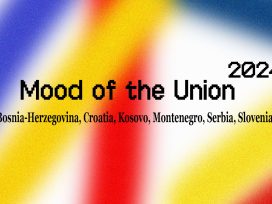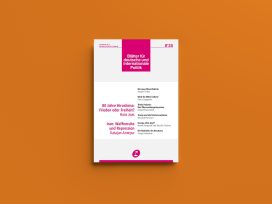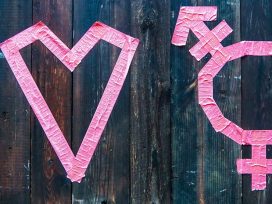Last autumn I was at a flea market somewhere in the suburbs of the Polish city of Wroclaw. The day before I was due to return to Croatia and the Balkans, I unexpectedly found myself in need of an extra travel bag. I didn’t want to pay much for it; I have enough bags and suitcases in Zagreb as it is. I only needed it for the trip home, and would probably throw it away once I got there. The best way to find a bag like this is to head to a flea market: some squalid place piled high with cheap clothes and smuggled accessories. It is at open-air markets like these that the marginalized transitional citizenry of eastern Europe comes together every weekend.
The same is true of Western Europe, it is the migrant Balkan and eastern European population that gathers in such places, eager to feel at home amongst their own, or to satisfy their own consumer needs without too much financial outlay. While much of European life revolves around department stores and shopping centres, the European poor, the marginalized and the immigrants remain dependant on these suburban markets. It rarely enters your head to visit these places when you first arrive in a major city like Milan, Frankfurt, Berlin, Vienna or Prague. But if you find yourself at one of them by chance, the things you see there will probably prove more interesting and more instructive than any number of cultural and historical sights recommended by the guidebooks. These flea markets might not provide you with a true and accurate picture of today’s Europe – you’d have to be a left-wing romantic or a writer to believe they did. But it is at these internal boundaries of Europe, on the peripheries of the continent’s great cities, that you will get some idea of what the geographical margins of Europe – whether in Moldova, Romania or the Balkans – actually look like. And you may well recognize some of the sicknesses from which contemporary Europe suffers. You might even identify the starting point of a new plague which, although different from its medieval predecessors, will go on to ravage the continent.

Memory for sale
I didn’t have such great ambitions in Wroclaw, however: I just wanted to find a cheap bag. With my homeward journey approaching, I had amassed too many things for my red Samsonite suitcase to cope with. Even so, as I drove towards the outskirts – a journey which took a long time, and which made Wroclaw appear larger, more spread out than it really was – all kinds of other things passed through my mind. I thought about how flea markets weren’t just places where cheap clothes, smuggled goods, far-eastern electronics and broken radios were sold. They were also places where the memory of the city was on sale, whether in the form of worthless bric-a-brac, kitschy memorabilia, family photographs, stamp albums or old magazines. It is from these things that a conscientious and patient observer might uncover the memory of a particular place.
For many years, at least until I had become sick to death of the Croats and their literature, I had been a participant at the Frankfurt Book Fair, and each time I was there I made a compulsory visit to the opposite bank of the river Main. Here, spread across a broad meadow beside the river, Frankfurt’s flea market offered a kaleidoscopic picture of the city. Despite the fact that Frankfurt had been levelled by Allied bombing in 1945, you could still find surviving examples of Belle-Époque china, and soup bowls bearing an ominous black swastika on the reverse side (where nowadays, as a rule, it says “Made in China”). The market also offered up a surprisingly thorough documentary account of the events of 1968, with periodicals, magazines, newspaper cuttings and even police photo albums of student demonstrators, together with all manner of other rubbish that told you a great deal more about Frankfurt’s past than any guidebook ever could. I discovered a lot more about the city at the flea market than in the endless, neon-lit exhibition halls that hosted assemblies of the Gutenberg Galaxy every October. I would frequently be seized by depression at the book fair, aware of the unimportance of my language and the inferiority of my culture, and the severely limited possibility of me learning anything new there. At Frankfurt’s flea market, however, I felt perfectly at home.
All this passed through my mind during the drive towards Wroclaw’s suburbs. I had known in advance that Wroclaw would actually be much more interesting, and much closer to me, than Frankfurt. Not only because this was eastern Europe – and I am an eastern European myself – but also because Wroclaw was a border city, a city on the margins. Things had happened here that the rest of Europe wanted to forget, or at least pretend it hadn’t seen. For a start, it was here that ethnic cleansing took place in the immediate aftermath of 1945, regardless of the fact that the victory of the anti-fascist coalition was supposed to bring such things to an end. I fully expected to find evidence of German Breslau at the flea market, not to mention fragments of Polish communist history, as well as all kinds of other things.
Spread out for over a kilometre on both sides of an uprooted former railway line was an endless row of market stalls selling cheap clothes and consumer goods, mostly of unknown provenance. On Saturdays and Sundays you can buy almost anything you want here. Not only can you kit yourself out with a whole new wardrobe at very little cost, you can also find winter sports gear, buy a swimming costume and diving goggles, or acquire an entire set of domestic appliances from a washing machine to a television (the latter boasting a screen of frighteningly large and thin proportions). You can also buy fresh bread, and cheese made in the Polish mountains – or perhaps made in Holland and given a Polish-mountain makeover. It is hard to think of anything that you couldn’t buy there; except for memory. The one thing you can’t find at the Wroclaw flea market is memory.
Rubbish and not much else
It took me about 100 metres of walking and ten minutes of looking around to find the bag I needed, a bag that will probably serve me well for years to come. Although very cheap, it is sufficiently sturdy to allow any number of hard-hearted airport workers to throw it around the cargo hold, jump up and down on it, or crush it beneath the coffins in which Eastern European migrants are journeying homeward. Having solved the problem of the bag, I set about searching for objects from the past, objects which might tell me something about the city and the country. I suspected that I would have to force my way to the outer reaches of the flea market in order find the things I was looking for. Just as flea markets themselves tend to be on the peripheries of large cities, so memorabilia and antiques are always found on the periphery of the flea market.
However, as I made my way through the endless crowds and neared the end of Wroclaw’s enormous, bazaar-like market, I realised that instead of getting more interesting, more select, more redolent of the past, the goods simply became cheaper and tattier, until finally they just turned into rubbish. In among this rubbish were a few items from the socialist period: the odd Soviet badge bearing the profile of Vladimir Lenin, a broken Romanian water heater, and piles of vinyl records featuring the kind of second-rate Western pop that had probably meant something to someone in the Poland of the 1970s and 1980s. But there was nothing of local provenance, nothing original, nothing that bore the stamp of the city or its collective memory. It was as if Frankfurt had preserved more of itself in the wake of the air-raids of 1945 than Wroclaw could muster for the entire period prior to 1990.
I was disappointed, but not exactly surprised. I felt as if I was at home in the Balkans. Our own open-air markets frequently look pretty similar: a mountain of cheap clothes, but very little in the way of history or memory. In essence, that is what the Balkans are today: a worthless pile of cheap clothes, without history, memory or true identity. It is from this basic pattern that all of today’s Balkan nationalisms have been cut. And it is only by means of these bloodthirsty and mindless nationalisms that politics and culture in the Balkans can be recognized. Although they can only be recognized if you peer a little more closely and listen a little more carefully to those smoothly-ironed people in Hugo Boss suits, those presidents and prime ministers of Croatia, Serbia, Macedonia, Bulgaria and Kosovo. These people have a tendency to talk total nonsense in (frequently very good) English about the thousand-year history of their small nation, during which, of course, they were mistreated by their immediate neighbours; neighbours from whom they might differ only in terms of religious faith, or in the minor nuances of verb declensions in an otherwise common language.
Presidents and prime ministers of these Balkan countries, who are as a rule nationalistic scoundrels and good-for-nothings, can frequently be seen jetting off in recently purchased government aeroplanes to sell their policies to Europe. And they always do it in the same way, regardless of whether we’re talking about the new prime minister of Serbia, or the old president of Croatia. As soon as they arrive in Europe, they set about convincing their hosts that they represent the only guarantee that the Balkans won’t descend again into war and massacre. But if Brussels doesn’t give them its support, or if European banks don’t provide them with sufficient credit, then their political opponents will come to power instead. And when this happens, Europe will see what trouble and strife really looks like.
Political smugglers
It is through this kind of politics, and this alone, that Croatia has arrived at the threshold of the European Union. Croatian presidents, prime ministers, foreign ministers and cabinet members have achieved this historic success through the same mixture of fraud and deceit that is also used by their colleagues from Serbia, Kosovo and Macedonia. In place of the serious diplomacy that our TV screens seem to tell us is the European norm, the Croats have achieved their transition from communism to democracy, from the Balkans to the European Union, by employing the strategies of the worst flea-market traders: the traders who come only once and never again, because they sell the kind of goods that look like the genuine article but subsequently turn out to be rubbish. Luckily for me, I didn’t come across traders like that in Wroclaw. The bag I bought there is of very good quality indeed, and not only survived the trip to Zagreb but will probably survive all my future travels around Europe as well.
The person who sold me the bag is a far more serious trader than Croatian president Ivo Josipovic or Croatian foreign minister Vesna Pusic. Or perhaps he differs from them in the substance of his work. That is to say, traders at the flea market and smugglers of goods from the East will probably be back again the following week, so if they do sell you a load of rubbish then at least you can come back and seek them out. Mr Josipovic and Mrs Pusic, on the other hand, will be able to breathe easy once they sell their fake policies to Brussels, as there will be no future opportunity for the disappointed customer to get their money back.
Croatian leaders have behaved like utter fraudsters in the way they have sold Europe falsely-declared goods. To take one example: in order to begin EU accession negotiations, Croatia was obliged as early as 1997 to enact a constitutional law guaranteeing the rights of national minorities. One provision of the new law was that the Serbian national minority – a minority that was three times smaller than it had been during the pre-war years, as most of them had fled to Serbia either under pressure from the Croatian government or because of some other reason – should have the right use Cyrillic. Even though Croats and Serbs both use the Latin script on the whole, the Cyrillic script remains part of the Serbian cultural tradition. Serbs, especially those who live outside Serbia, see the Cyrillic script as a confirmation of their identity. A little complicated, and also a little odd, perhaps, but a reasonably typical example of nationality issues in the Balkans. Anyway, the important thing is that Croatia adopted a law guaranteeing its Serbs the right to use Cyrillic, and this happened as early as 1997.
When this right finally came into effect a few months prior to the country’s entry into the European Union in 2013, however, the law was opposed by Croatian war veterans. Their protest was supported by state television and by the overwhelming majority of the media, by all strands of the parliamentary opposition, as well as by some members of the government. Croatian president Ivo Josipovic told the protesters that if they wanted to change the law then they should launch an initiative to campaign for it, as if the re-banning of Cyrillic was okay if it was done via constitutional means. He said it in all seriousness, but calculated that outside Croatia his voice wouldn’t be heard. When news arrived from Brussels the next day that some lowly official had warned the Croatian government that the law on national minorities must be respected, Josipovic suddenly changed his tone. He claimed that his comments of the previous day had been uttered in jest, and that he had been poking fun at those campaigning against the law. The truth, however, is that he behaved like a fraudster at the bazaar, or like a smuggled-goods trader at the flea market, who has been collared by a dissatisfied customer after passing off fake goods. And of course he is ready to return the customer’s money; after all, it was only a joke.
Destroying the memory
In the Balkans, myths and legends serve those ends which are elsewhere served by history, whether we are talking about the official history taught in schools, or the unofficial history of everyday life. Which is why the destruction of every kind of individual and collective memory is so important in the Balkans of today. Important, that is, to the rulers, nationalist fraudsters that they are, and their cultural elites. Memory contains the roots of subversion and the potential to overturn the ruling order, which is why memory has to be forbidden. Elsewhere in Europe, nationalism is oriented towards the past, and is put to use by political conservatives who are eager to hold up change and reform. In the Balkans, and especially in Croatia and Serbia, nationalism is based on falsified, counterfeited, fictional history, on things which never even happened, but in which the whole of society has to believe. The non-believer has to be excluded, driven out and eliminated.
The non-believer is more dangerous than any enemy. Elimination of the non-believer is not, however, carried out by the police or the courts. People are not sent to concentration camps – that is another piece of the Croatian past which people are not supposed to remember. Instead of state repression, those excommunicated from the collective fiction are subjected to a collective, social repression. Those who don’t believe that Croats are better than other nations, that they have been innocent victims throughout their history, and that a Croat can’t be a war criminal even if he kills a hundred Serbs, those who don’t believe in the falsification of memory, will be persecuted by their own neighbours and friends, by the whole social community, in full view of a peaceful and tame Europe, while President Josipovic and Foreign Minister Pusic sell Europe a false picture of Croatia.
So there you are. That is why, when visiting a Wroclaw flea market last autumn, I briefly felt as if I was back in the Balkans. But as soon as I set off towards the city centre, I felt a very long way away from the Balkans indeed.







